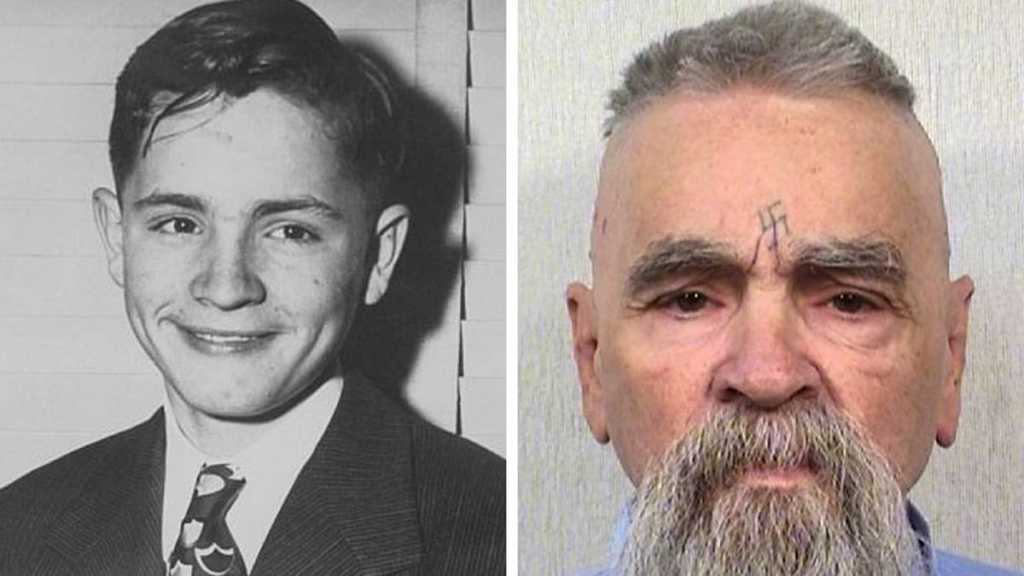Charles Luther Manson is one of the most infamous figures in modern history, known for his cult leadership and involvement in the brutal murders that shocked the world during the late 1960s. His name evokes images of chaos, manipulation, and a dark chapter in American history. Manson's influence extended far beyond the crimes he orchestrated, as his twisted philosophy and charisma attracted followers who committed heinous acts in his name.
Beyond the sensational headlines, Manson's life is a complex tale of societal failures, psychological manipulation, and the darkest aspects of human nature. This article delves into the life, crimes, and legacy of Charles Manson, exploring the factors that led to his rise as a cult leader and the impact he had on society. By understanding Manson's story, we can gain insight into the dangers of unchecked power and the importance of critical thinking.
As we explore the life of Charles Luther Manson, it's essential to approach the topic with caution. The content discussed here is part of the Your Money or Your Life (YMYL) category, as it deals with sensitive and potentially disturbing subject matter. Our goal is to provide accurate, informative, and well-researched content while maintaining a respectful tone.
Read also:Exploring The Fox Theater Tucson Az A Historic Gem
Table of Contents
- Biography of Charles Luther Manson
- Early Life and Childhood
- Criminal Career and Rise to Infamy
- The Family: Manson's Cult
- The Tate-LaBianca Murders
- Trial and Conviction
- Life in Prison
- Legacy and Cultural Impact
- Psychological Insights into Manson's Mind
- Conclusion and Final Thoughts
Biography of Charles Luther Manson
Personal Information
Before diving into the details of Manson's life, here is a summary of his personal information:
| Full Name | Charles Luther Manson |
|---|---|
| Date of Birth | November 12, 1934 |
| Place of Birth | Cincinnati, Ohio, USA |
| Date of Death | November 19, 2017 |
| Place of Death | Kern Medical Center, Bakersfield, California, USA |
Charles Luther Manson was born on November 12, 1934, in Cincinnati, Ohio. His early life was marked by instability and hardship, which would later shape his worldview and actions. Despite his notorious reputation, Manson's journey from a troubled youth to a cult leader provides valuable lessons about the dangers of manipulation and the importance of mental health awareness.
Early Life and Childhood
Charles Manson's childhood was anything but ordinary. Growing up in poverty, he experienced neglect and abandonment from a young age. His mother, Kathleen Maddox, struggled with alcoholism and often left Manson in the care of relatives. By the age of 13, Manson had already begun a life of petty crime, which would eventually lead to his incarceration in juvenile detention centers.
During his formative years, Manson developed a knack for manipulating others, a skill that would later define his leadership style. According to psychologist Dr. Joel Dyer, Manson's early experiences of rejection and isolation contributed to his antisocial personality traits. These traits, combined with his charismatic charm, allowed him to exert control over others with ease.
Criminal Career and Rise to Infamy
Manson's criminal career spanned several decades, beginning with small-time offenses such as theft and forgery. However, it was his ability to attract followers and establish a cult-like group that truly set him apart. By the late 1960s, Manson had gathered a group of young, disenfranchised individuals who sought meaning and purpose in their lives. This group, known as "The Family," became the foundation of his infamous legacy.
Key Characteristics of Manson's Followers
- Most were young women seeking escape from societal norms.
- Many came from troubled backgrounds or unstable family environments.
- They were deeply influenced by Manson's apocalyptic vision and promises of a new world order.
Manson's ability to exploit the vulnerabilities of his followers was a testament to his psychological acumen. He preyed on their insecurities and offered them a sense of belonging, which they desperately craved. This dynamic allowed him to maintain control over the group and manipulate them into committing heinous acts on his behalf.
Read also:Everton Vs Liverpool A Rivalry That Defines English Football
The Family: Manson's Cult
The Family was more than just a group of individuals; it was a tightly-knit community bound by Manson's ideology. Members lived communally, sharing resources and adhering to Manson's strict rules. The group's activities ranged from petty theft to drug trafficking, but it was their involvement in murder that cemented their place in history.
Core Beliefs of The Family
- Helter Skelter: Manson's belief in an impending race war that would lead to societal collapse.
- Divine Authority: Manson claimed to be the reincarnation of Jesus Christ and encouraged his followers to view him as a prophet.
- Rejection of Materialism: Members were encouraged to abandon mainstream society and embrace a primitive, communal lifestyle.
These beliefs, coupled with Manson's charismatic leadership, created a powerful psychological bond among the members of The Family. This bond proved to be both their strength and their downfall, as it led to their involvement in some of the most infamous crimes of the 20th century.
The Tate-LaBianca Murders
The murders of Sharon Tate and the LaBianca family remain some of the most shocking and brutal crimes in American history. On the night of August 9, 1969, members of The Family invaded the home of actress Sharon Tate and her friends, brutally murdering five individuals. The following night, the group targeted the home of Leno and Rosemary LaBianca, killing them in a similarly violent manner.
These murders were not random acts of violence; they were part of Manson's twisted plan to incite racial tension and spark a race war. His belief in "Helter Skelter," a concept derived from a Beatles song, drove his actions and those of his followers. The murders sent shockwaves through the nation, prompting a massive manhunt that ultimately led to Manson's arrest.
Trial and Conviction
The trial of Charles Manson and his followers captured the attention of the world. Held in Los Angeles, the trial was marked by dramatic courtroom antics and intense media coverage. Manson's bizarre behavior, including carving an "X" into his forehead, only added to the spectacle. In 1971, Manson and three of his followers were convicted of murder and sentenced to death.
However, in 1972, California abolished the death penalty, and Manson's sentence was commuted to life imprisonment. Despite his conviction, Manson continued to exert influence over his followers, even from behind bars. His trial remains a defining moment in American legal history, highlighting the complexities of prosecuting cult-related crimes.
Life in Prison
During his time in prison, Charles Manson became a media sensation. He gave numerous interviews and wrote letters to journalists, often espousing his bizarre beliefs and criticizing society. Despite his notoriety, Manson's prison life was far from glamorous. He spent much of his time in solitary confinement and faced numerous disciplinary actions for violent behavior.
Over the years, Manson attempted to reinvent himself, claiming to have renounced his violent past. However, his efforts to gain parole were consistently denied, with authorities citing his continued influence over others as a significant risk. Manson remained incarcerated until his death in 2017, at the age of 83.
Legacy and Cultural Impact
Charles Manson's legacy is a complex one. While his crimes remain some of the most infamous in history, his influence extends far beyond the legal system. Manson's story has been the subject of numerous books, films, and documentaries, each offering a different perspective on his life and crimes. His name has become synonymous with evil, manipulation, and the dangers of unchecked power.
Cultural References to Manson
- The film "Helter Skelter" (1976) provided a detailed account of the Tate-LaBianca murders.
- Quentin Tarantino's "Once Upon a Time in Hollywood" (2019) explored the era surrounding Manson's crimes.
- Musician Marilyn Manson adopted his stage name as a commentary on the intersection of celebrity culture and violence.
Manson's impact on popular culture serves as a reminder of the enduring fascination with true crime and the darker aspects of human nature. His story continues to resonate with audiences, prompting discussions about the societal factors that contribute to such extreme behavior.
Psychological Insights into Manson's Mind
Understanding Charles Manson's psychology is crucial to comprehending his actions and the influence he wielded over others. Psychologists have identified several key traits that contributed to his ability to manipulate and control his followers:
Key Psychological Traits
- Narcissism: Manson exhibited an inflated sense of self-importance and a need for admiration.
- Charisma: His magnetic personality allowed him to attract and influence others with ease.
- Antisocial Personality Disorder: Manson demonstrated a disregard for societal norms and a lack of empathy for others.
These traits, combined with his troubled upbringing and early exposure to crime, created the perfect storm for his rise as a cult leader. By studying Manson's psychology, we can gain insight into the mechanisms of manipulation and the dangers of unchecked power.
Conclusion and Final Thoughts
Charles Luther Manson's life and crimes serve as a cautionary tale about the dangers of manipulation, unchecked power, and societal failures. His ability to attract followers and instill fear in society highlights the importance of critical thinking and mental health awareness. While Manson's legacy is one of infamy, it also serves as a reminder of the resilience of the human spirit and the importance of justice.
We encourage readers to reflect on the lessons learned from Manson's story and to engage in meaningful discussions about the issues it raises. Share your thoughts in the comments below or explore other articles on our site for more insights into true crime and its impact on society. Together, we can work towards a better understanding of the world around us and the forces that shape it.

